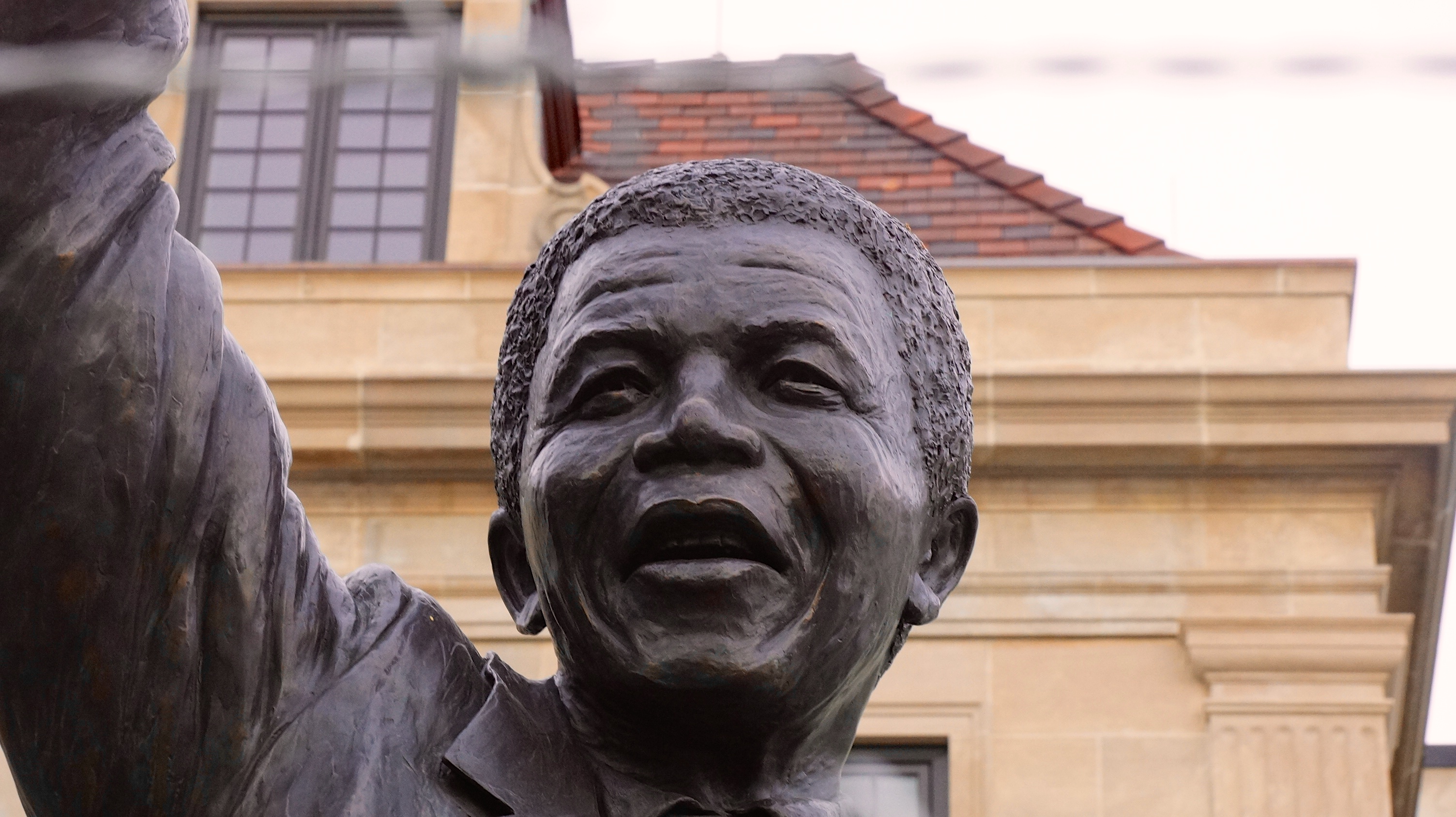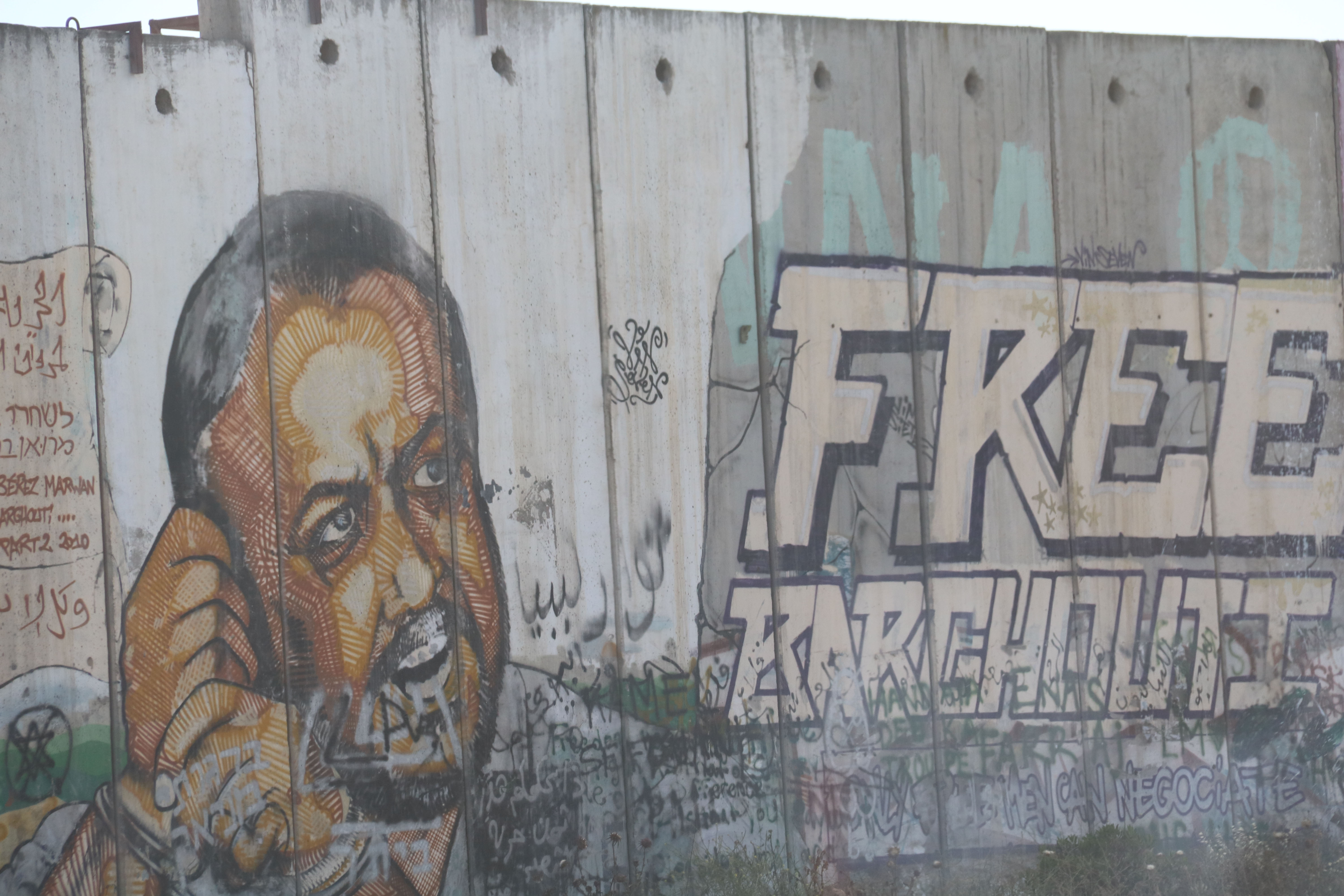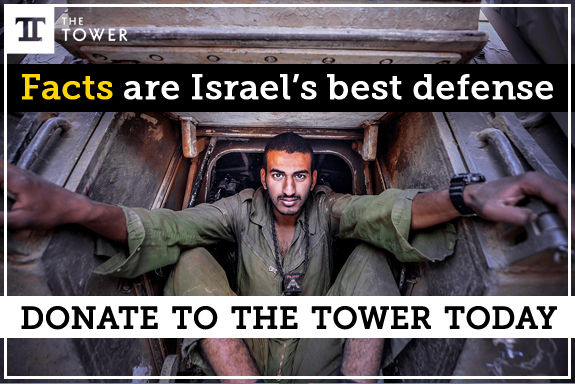One of the most popular Palestinian leaders is a remorseless killer. Can he also be the heir of South Africa’s greatest peacemaker?
Someday, Mahmoud Abbas, who is in his early 80s, is going to end his term as president of the Palestinian Authority, whether through exile, retirement, or death. Afterwards, of course, there will be a struggle to replace him.
One possible successor is Marwan Barghouti, a PA official who is currently serving multiple life sentences in an Israeli prison for his involvement in the murder of five Israelis during the Second Intifada.
In November 2014, Barghouti called for an uprising against Israel, which, if heeded, will likely kill many Israelis and Palestinians. Nevertheless, Barghouti is regularly described as a “Palestinian Nelson Mandela.” Mandela, of course, spent many years in prison before earning the trust of his adversaries and eventually becoming president of South Africa. As president, Mandela achieved some measure of reconciliation between blacks and whites and, as a result, has been enshrined as a kind of secular saint, much like Mahatma Gandhi and Martin Luther King, Jr. John Carlin, author of Invictus: Nelson Mandela and the Game that Made a Nation, which was made into a moving film in 2009, described Mandela as “the anti-Hitler.”
Carlin’s book describes how Mandela used the victory of the South African national team (known as the Springboks) in the 1995 Rugby World Cup to unify the country. It was a huge achievement. Black South Africans rooted against the Springboks during the Apartheid era, as it was a team historically comprised of Boers, who black South Africans regarded as their archenemies. Still, Mandela was able to pull it off. When the Springboks won, the entire country celebrated.
“Mandela mastered, more than anyone else alive (and, quite possibly, dead), the art of making friends and influencing people,” Carlin wrote. “No matter whether they started out on the extreme left or the extreme right, whether they initially feared, hated, or admired Mandela, everyone I interviewed had come to feel renewed and improved by his example. All of them, in talking about him, seemed to shine.”
The notion that Barghouti—or any political leader in Palestinian society—is capable of playing the role that Mandela did is far-fetched, yet it has its adherents. Some European lawmakers, for example, have nominated Barghouti for the Nobel Peace Prize.

A statue of Nelson Mandela in front of the South African Embassy in Washington, DC. Photo: Ted Eytan / flickr
One of the most ardent proponents of the Barghouti-as-Mandela theme is Ahmed Kathrada, a recently deceased member of the African National Congress who, in 2013, wrote the Robben Island Declaration, a text that describes Barghouti as “the most prominent and renowned Palestinian political prisoner, a symbol of the Palestinian people’s quest for freedom, a uniting figure and an advocate for peace based on international law.”
The declaration calls for Barghouti’s release—and the release of thousands of other prisoners in Israeli jails—as a necessary prerequisite for a peaceful end to the conflict between Israel and the Palestinians. “One of the most important indicators of the willingness to make peace with your adversary is the release of all political prisoners, a powerful signal of the recognition of a people’s rights and just demands for freedom,” it reads.
The message implicit in Kathrada’s declaration is that Barghouti has the same leadership qualities as Mandela and, as a result, will somehow be able to achieve peace just as Mandela did, if only Israel would free him and let him work his magic. And furthermore, it implies, the onus for change lies on the Israelis, who must release Barghouti if they really want peace.
What proponents of the “Palestinian Mandela” template fail to acknowledge is that if a Palestinian Mandela did arrive on the scene, he or she would have to impose greater demands on the Palestinians than the Israelis, just as Nelson Mandela made greater demands on the black South Africans who followed him than the white South Africans with whom he made peace. In an ongoing effort to earn the trust of the whites, Mandela demanded that blacks abandon any fantasy of expelling them. He demanded that black South Africans view their white counterparts as vulnerable human beings whose trust and cooperation were necessary to achieve peace.
He did this first with his fellow prisoners on Robben Island, demanding they acknowledge “that deep down all the guards were vulnerable human beings,” Carlin wrote. Yes, he demanded respect and dignity for black South Africans, but he also demanded that they treat whites the same way.
“He did not crush his enemies,” Carlin stated. “He did not want to humiliate them. He did not want to repay them in kind. He just wanted them to treat him with no-frills, run-of-the-mill respect.”
Mandela also had the foresight and courage to demand that the African National Congress abandon its view of the white South Africans as European colonialists who had no right to live in Africa. “For Mandela to challenge that view, to declare that the Afrikaners had as much right to be called Africans as the black Africans with whom he shared his cells, took some pluck,” Carlin noted.
In the Palestinian context, a would-be Mandela would have to confront and contend with religious, not racial issues. Many so-called peace and justice activists would have us believe that the primary obstacles to peace are Jewish claims to the West Bank, but the real challenge is Muslim supremacism. The Palestinian elite wields power because of its willingness to, at the very least, pay lip service to this supremacism. This is how Yasser Arafat achieved and stayed in power, and how Abbas has remained president of the Palestinian Authority. By way of comparison, the African National Congress under Mandela’s leadership did not promote an ideology of black supremacism, and Mandela himself repudiated such ideas time and again.
Efforts to portray Barghouti as a Palestinian Mandela obfuscate the issue of his beliefs, which are antithetical to those of Mandela. For example, in a March 2014 Guardian article titled “Release Marwan Barghouti. He can be Palestine’s Nelson Mandela,” Martin Linton declared that Barghouti “always opposed actions targeting Israeli civilians, even while defending the right of Palestinians to resist.” This claim appears to be based on an op-ed Barghouti wrote for The Washington Post in 2002, in which he asserted, “While I, and the Fatah movement to which I belong, strongly oppose attacks and the targeting of civilians inside Israel, our future neighbor, I reserve the right to protect myself, to resist the Israeli occupation of my country, and to fight for my freedom.”
There’s just one problem: Barghouti certainly did support attacks on civilians, and we know this because he explicitly said so in public. Moreover, he acted according to his beliefs. Prior to his arrest in 2002, he was the leader of Tanzim and the al-Aqsa Martyrs Brigade, terrorist organizations responsible for the deaths of dozens of Israeli civilians on both sides of the Green Line. In 2012, Haaretz stated succinctly, “There is no question he supported and encouraged violence.” It reported in July 2016 that, as the Second Intifada progressed, Barghouti declared, “The time when only we sacrifice victims is past. We must take revenge. We must kill Israelis. Yes. We have bullets. We have rifles, and they will be aimed at the occupation.” He also predicted that the Second Intifada “will be the last round of violence, because the Palestinians have a feeling that they restored their self-respect through the attacks.”
Such sentiments were completely foreign to Mandela. In a speech at the 1964 trial that put him in prison, Mandela admitted that he did support the use of sabotage, but only to obtain the rights that had been denied to black South Africans, which they had previously hoped to obtain through non-violent methods. By way of comparison, the Palestinians have used terrorism since the beginning of their national movement, and did so even after they were offered statehood at the 2000 Camp David negotiations.
A Palestinian Mandela would also have to make symbolic demands on his people that they would likely abhor, since they have been taught to hate Israel and Jews for decades.
For example, in addition to supporting the Springboks, Mandela called upon South Africans to embrace a hybrid version of their national anthem that included verses from “Die Stem” (“The Call”), an Afrikaner song written in 1918, as well as verses from “Nkosi Sikele iAfrica (“God Bless Africa”), written in 1897. At one point, the executive committee of the African National Congress voted to replace the Afrikaner song with the black African anthem, but Mandela persuaded the committee to rescind its decision.
“This song that you treat so easily holds the emotions of many people who you don’t represent yet. With the stroke of a pen, you would take a decision to destroy the very—the only—basis that we are building upon reconciliation,” he told the committee. In her book Anger and Forgiveness: Resentment, Generosity, Justice, Martha Nussbaum writes that this “was a large demand: each group had to learn to see the world, in effect through the eyes of the other.”

A painting of Marwan Barghouti on Israel’s security barrier near the West Bank village of Qalandiya. Photo: Haytham Shtayeh / Flash90
A Palestinian Mandela would also call for peace during times of increased tension and anger. This is what he did after the assassination of the beloved ANC activist Chris Hani by a Polish immigrant in April 1993, when efforts to move to a one-man-one-vote system were at a critical juncture. Hani’s assassination threatened to spark a violent civil war, but Mandela rose to the occasion. Carlin writes that the challenge Mandela faced “wasn’t winning over the whites, it was to persuade his own people” not to respond with violence. “To do this he had to reroute the river of their anger, which was headed straight for hostile confrontation with white South Africa. To succeed he had to appeal not to their resentment, but to what remained of their generosity.” To accomplish this goal, Mandela may have exaggerated the heroism of a white South African who wrote down the license plate of the assassin’s getaway car.
In sum, Mandela demonstrated, on repeated occasions, a willingness to do exactly the opposite of what Palestinian leaders—including Barghouti—have done time and again over the past several decades, which is to incite hostility toward Israel.
Ironically, it is precisely this hostility that makes the myth of the Palestinian Mandela so attractive. Mandela required his followers to abandon their desire to seek revenge for past suffering and seek solutions to the problems they currently faced instead. He also made his black followers understand that as much as they may have hated white South Africans, a secure and prosperous future for black South Africans simply could not be had without the trust and assistance of whites.
It was these efforts that convinced the Botha regime’s security establishment that Mandela was the last, best chance for a peaceful settlement. When South African Defense Minister Kobie Coetsee first began his secret talks with Mandela at Volks Hospital in 1985, his initial goal was a limited one—exchange Mandela’s release from jail for a disavowal of violence. But as the conversations progressed, Coetsee began to hope for a larger settlement to the conflict and not merely a cessation of violence. These hopes were inspired by two factors: Mandela’s courtesy during the talks, and his previous efforts to change the mindset of black South Africans, which were to bear fruit in the years ahead.
I got a clear sense of just how far Palestinian elites are from following Mandela’s example during the first night of the 2014 Christ at the Checkpoint Conference in Bethlehem. More than 400 Christians from Europe and North America attended the event, which is held every two years at the Bethlehem Bible College. On the day the conference began, Amnesty International published a report saying the inhabitants of a Palestinian refugee camp in Yarmouk, Syria had “been brought to the brink of starvation, forced to forage for any food that they can find” as a result of a siege imposed by the Assad regime. Despite the differences I had with the organizers and speakers at the CATC event, I was glad that Palestinian leaders who addressed the crowd would get an opportunity to draw attention to the plight of their fellow Palestinians in Yarmouk.
But they said nothing, not one word about their compatriots starving to death less than 200 miles away. No responsible group of leaders truly interested in the welfare of the people it leads would miss an opportunity to draw attention to what was happening to Palestinians in Yarmouk, but that night they did. Organizers of the event spoke about the unfolding catastrophe the next day, after I drew attention to their failure about the issue. Mandela would have addressed the suffering in Yarmouk up front, not as an afterthought. By failing to ask for aid to their countrymen, Palestinian political and religious leaders chose to demonize Israel to the exclusion of pursuing the welfare of the people they lead.
This has been a problem for decades. Instead of following the example of Mandela, who demanded that his followers think seriously about their future and what they needed to do to prosper as a community, Palestinian elites promote a backward-looking revanchism that has condemned several generations of Palestinians to death and suffering. By making themselves opponents of Jewish efforts to flourish in their homeland, Palestinians throw away any hope of flourishing in a state of their own. That is the choice they have made.
Clearly, Mandela’s great accomplishment was to turn violence and hatred into the generous desire for peace and reconciliation. A Palestinian Mandela would have to do the same. He would have to show the willingness and the ability to get Palestinians to abandon their efforts to murder, demonize, insult, humiliate, and intimidate Israeli Jews into leaving their homeland or, barring that, submit to Arab and Islamic dominance over their lives. Thus far, the Palestinian leadership has shown an unwillingness, to say the least, to do so, and Barghouti is no exception.
It is time to stop using the image of Nelson Mandela as a club to beat Israel and start using it as a yardstick to measure Palestinian efforts for peace.
![]()
Banner Photo: Flash90






